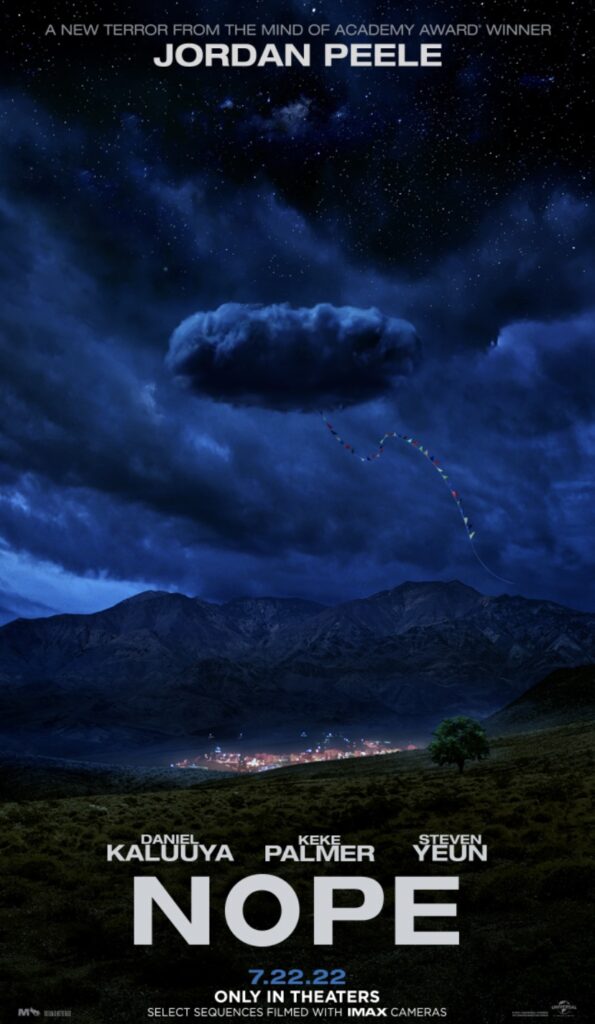Review – Nope (2022)


OJ (Daniel Kayuuya) and Emerald Haywood (Keke Palmer) have been making ends meet at their Californian horse ranch ever since their father died in a freak accident. With savings becoming dire and OJ selling the horses to neighbour/former childhood star Jupe (Steven Yeun) to get by, they discover a jackpot hovering over them. With the help of tech installer Angel (Brandon Perea), they venture out on a mission to capture evidence of a UFO.

The contingency of exploitation is an enigma that defeats logical explanations. Humans as a species crave that feed that comes from tragedy, a lustful but apprehensive desire to absorb terror like an uncontrollable need to blemish a chance of achieving a completely placid mental state. Shamelessly forming from the attraction of the spectacle is a myriad of threats, keeping the mind on alert, knowing that danger is just around the corner; Obsession is a blessing and a curse. Jordan Peele’s follow up from the acclaimed Get Out (2017) and equally applauded Us (2019) is Nope (2022), quite possibly the most jaw dropping sci-fi, horror, drama, mystery to enter the mainstream market in the last twenty years.

Just as the world was seemingly crumbling in 2020, many cinema aficionado’s were concerned over the future of film, with Peele belonging to the worried mob. It was at that moment that he knew his next film had to be a total pageant that deliberately dishes out way too much for the audience to handle, spiritually force feeding the masses as much onscreen swindling, distress, and catastrophe as they want.

In all of the tormenting comments made about the trajectory of human behaviour within Nope is the deeply enigmatic setting, performances, cinematography, and stupefying score. The dusty and desolate landscape filmed in IMAX comes straight out of an old fashion western, with monotonous beige dirt tracks absorbing any nearby signs of occupied space, as if the ranch is just a small pinprick in a grand vastness of nothing. OJ, Em, and Angel are made to feel insignificant, especially in comparison to what lies above them. This ignorance to their being doesn’t just open up the screen to stunning exhibition shots captured by cinematographer Hoyte Van Hoytema, but it also embodies the physicality of the situation. The beastly UFO isn’t necessarily a spaceship hoarding wide eyed, green skinned aliens, the saucer is the extraterrestrial product itself that chews people up and spits them out whilst also psychically resembling a biblically accurate angel. The sheer lack of respect Nope dishes towards its characters is just one step in the chaotic ladder Peele climbs in order to tyrannise the hierarchy. Not a single character feels untouchable, they all have an equal share of not making it through to the end, instead, the most innocent of all creatures and somewhat deserving of peace is the UFO.

Through distancing the ranch from common land, and detaching OJ, Em and Angel from others, the ‘being’ further obtains this status as otherness, and more importantly deadliness. Unlike in alternative alien features there are no throngs of weapons held by jacked-up Navy Seals ready to let rip an armour of projectiles. Instead, it treats the ranch like its playground, free to roam like one of Haywood’s horses.

Consequently deriving from the autonomy held by the UFO is the lack thereof shown within the lands occupants. A large factor of Nope’s narrative surrounds an incident that occurred on Jupe’s sitcom in the late 1990s surrounding its main character- a chimpanzee named Gordy. The events leading up to and following on from Gordy’s rampage is horrific to say the least, but what stands out most besides the visual escapades is the reality of the situation. Gordy was a wild animal that was treated like a ‘worker’ made to perform to appease a live audience, and like a ticking time bomb waiting to go off, it was only natural that a sudden change in scenario would cause Gordy to essentially ‘loose it’. Peele purposefully doesn’t show the massacre in graphic detail, in fact he doesn’t show the event (as it happened) in full length without interruptions at all. Somewhat, teasing the viewer knowing that they want to see Gordy go bananas ripping off faces and tearing into whatever flesh he finds. Peele’s dangling of the carrot firmly confirms his suspicions about the viewer, we may want to voyeuristically survey the primate gone mad, but we shouldn’t. Nope both tests the theory of spectacle and the greed for a show, whilst also denoting a sense of dignity back to the spectacle itself.

The same argument could be said towards Jupe, the childhood star who instead of discussing Gordy’s tragedy in a humane way, replays the tale through an SNL sketch that was held in its memoir. Jupe’s glassy reflection discussing the hilarity of the event, combined with the fact that he sits in his theme park profiting off of his childhood stardom is a deeply sad feat. Nope is a horror that shocks and scares, but more importantly it’s an emotional analogy of how fragility and empathy is only to be experienced temporarily, with grief to be fought off in an attempt to get back on the wagon as soon as possible.

Further clawing its way down to the bone is Nope’s unbeatable horrific elements that enforce an inescapable air of claustrophobia, enhanced by unspeakable imagery revolving trapped, bloody spaces and viscera soaked exteriors encased with a suffocating soundscape brimming with echoed screams and Martian-like humming. The internal UFO scene in question is a given for any viewer familiar with Nope, and for those that want a juicy infill before watching the future sci-fi staple, it can be guaranteed that the visual is nearly impossible to forget. Even harder to forget is that horrible sickly sensation that washes over you as you watch unsuspecting people meet the worst demise possible.

Joining the intense brigade of travesty is Peele’s signature mark of satire comedy that is veiled enough to not overpower the film, but still enough to share a chuckle, particularly the darkness of his humour. For instance, when OJ is asked by an actress what his name is, she cannot help but turn a judgemental eye towards his initials; of course, making an ill-informed nod to OJ Simpson, who in its entirety belongs to one of the media’s biggest spectacles in history. Exercising the brutal script to its maximum potential is the talents of Daniel Kaluuya and Keke Palmer, the film’s titular characters. As with many realistic family siblings, they are near complete opposites- a total extrovert vs introvert situation. OJ connects with the ranch’s horses with a sense of expertise because the peace within wrangling holds a devoutly vital equilibrium within his aura. In contrast is Em, who takes no prisoners in every situation she is placed in, lighting up the room and naturally drawing the limelight to her. The texture of having polar opposites join forces is a neat melody that Peele initiates. In a film about division from one another and the monetisation of adversity, perhaps Peele is making a statement showing that dissection and detachment is not the key to survival, but instead unity is.

Ultimately lying at the bottomless gut of Nope is the disgruntled commentary directly spitting back what society has become infatuated with. And in a cruel way, Peele stealthy knows that critics, vloggers, casual movie-goers, and diehard horror fans will all be commenting upon the spectacle and the need for dissection. The irony of digesting Nope’s message as fact, only to then perform exactly what Peele is commenting upon (via blasting the film all over social media) is such a stern example of the decisive layering that goes into his filmmaking.
Looking for more top horror lists and reviews? Check out our blog here..






